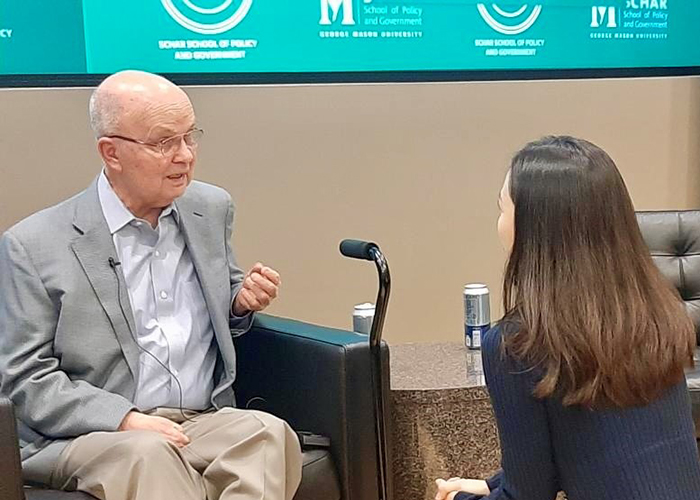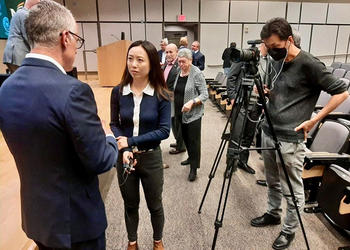Earlier this month, several Schar School of Policy and Government professors working in the Michael V. Hayden Center for Intelligence, Policy, and International Security took the stage at George Mason University’s Van Metre Hall for a first-of-its-kind event: The entire program was devoted to questions from the audience. Some 165 audience members attended live, with another 300 watching via YouTube stream. (Distinguished Visiting Professor and former acting and deputy director of the CIA Michael Morell, who had been called away at the last minute, lost his internet connection early in the program.)


The program was lively, informative, provocative, and, overall, a success. In less than two hours, the speakers covered countless compelling and timely topics as the audience led the direction of the conversation. What follows is a brief recap. You can see the replay here.
The first question was directed to the center’s founder and namesake, Michael V. Hayden, who was making his first on-stage appearance since suffering a stroke in 2018: “What is keeping you up at night these days?” His answer was succinct: “China, China, China.” Expressing his concerns about national security, he emphasized that the U.S. intelligence agencies need more information to accurately surmise China’s global intentions.
It has been a year since the Russian invasion of Ukraine started; an audience member wondered what the future holds for that beleaguered country and the international support it desperately needs. While talking about the role of the U.S. in defending Ukraine’s independence, Hayden said “we are good but we can do better…we should do more, not eventually but now.” He also predicted this spring to be hard for the country but reassured that Ukraine will eventually win.
A Schar School Democracy Lab Learning Community student expressed his concerns about the rampant theft of technology from U.S. sources and asked about the steps the country is taking to prevent it from happening. While it’s well-known that the cybersecurity industry has been growing steadily in the last few years and specialists are making significant advances, Visiting Professor and former CIA officer David Priess replied that “innovative government and innovative private sector is not enough. We need to cooperate with international partners.” To which Hayden Center Director and former CIA Chief of Staff Larry Pfeiffer encouraged students to explore technology “and don’t be afraid of it.”
Global tension abounds, particularly in China-Taiwan relations. In answering a question about that delicate hot spot, the intelligence experts on stage agreed that after Russia’s invasion of Ukraine, the probability of the escalation in China and Taiwan is much lower than it was a year ago. The sentiment delivered was that the U.S. should be in no rush to interfere in a meaningful manner.
Another Democracy Lab student wondered how U.S. intelligence is countering advances in foreign surveillance technology. Distinguished Visiting Professor Andrew McCabe, former acting director of the FBI, replied that the issue, “a slow-burning and considerable threat, hasn’t received the attention it deserves over the last 10 years or so. We’re very vulnerable to the tyranny of the urgent, so we run to the latest diplomatic kerfuffle.”
In short, government intelligence agencies, he suggested, struggle to advance in the way that private sector does and communication between public and private entities needs to be refined.
Of course, there was a Chinese spy balloon question. Surprisingly, the general opinion among these former intelligence leaders was that the entire situation was not that big of a deal and that the news media exaggerated it.
Hayden, for one, said “in this situation, [President Biden] did what he was supposed to do,” in shooting down the balloon and showing his support for the decisions made by those serving in his government.
